Nursing Theory: Exploring Philosophy, Epistemology, and Discipline
VerifiedAdded on 2020/05/16
|5
|1031
|88
Essay
AI Summary
This essay explores the core concepts of nursing theory, beginning with the author's personal philosophy of nursing, emphasizing the importance of holistic care, equal treatment, and non-judgmental interactions. It then delves into epistemology, defining it as the study of nursing knowledge and its role in critical comprehension and decision-making within the healthcare setting. The essay further examines the concept of discipline in nursing, highlighting its role in shaping professional conduct and commitment to patient wellbeing. Finally, the essay discusses empirical nursing research, tracing its evolution from early holistic views to the influence of Florence Nightingale and the importance of observation and education in establishing nursing as a profession. The essay incorporates references to support the arguments and provide context to the evolution of nursing as a discipline.
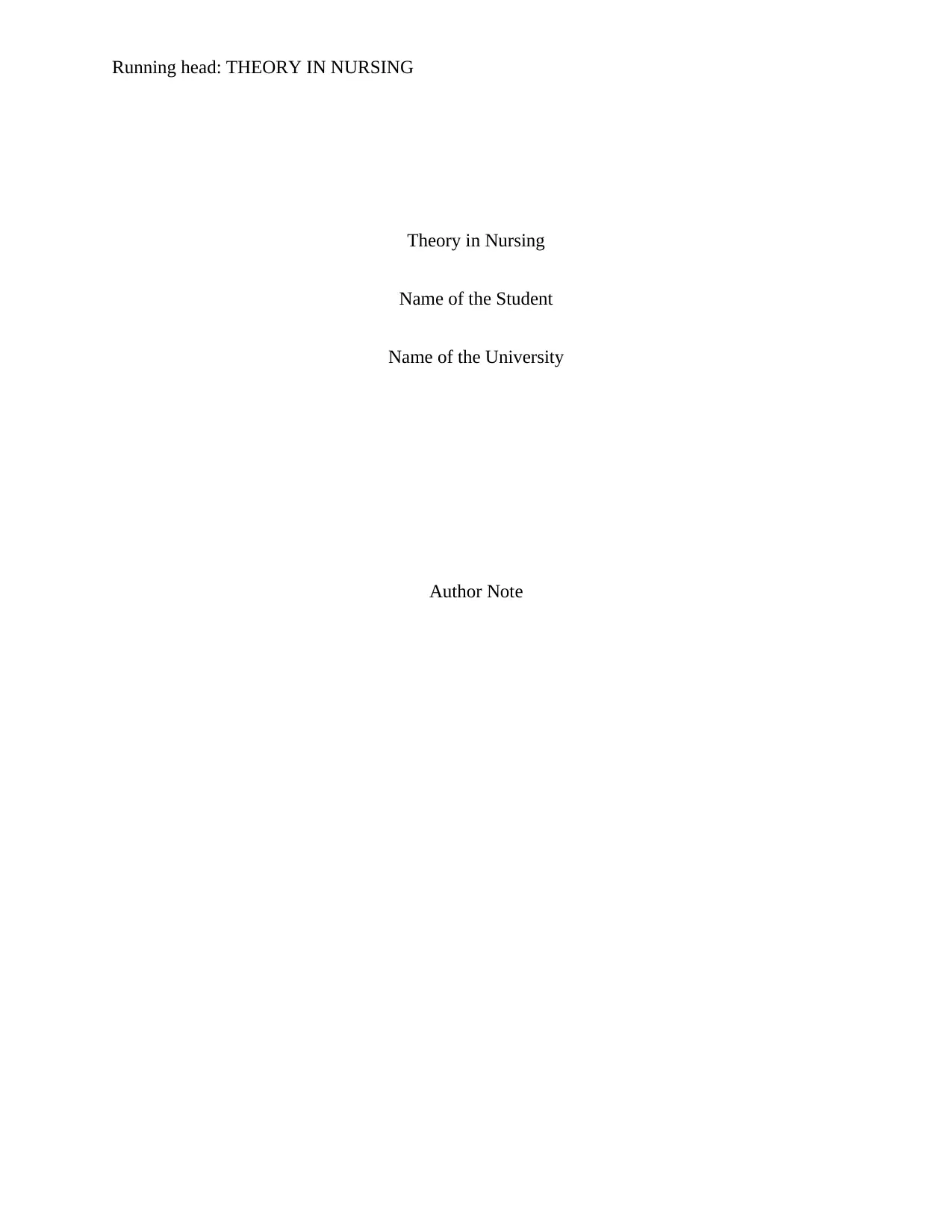
Running head: THEORY IN NURSING
Theory in Nursing
Name of the Student
Name of the University
Author Note
Theory in Nursing
Name of the Student
Name of the University
Author Note
Paraphrase This Document
Need a fresh take? Get an instant paraphrase of this document with our AI Paraphraser
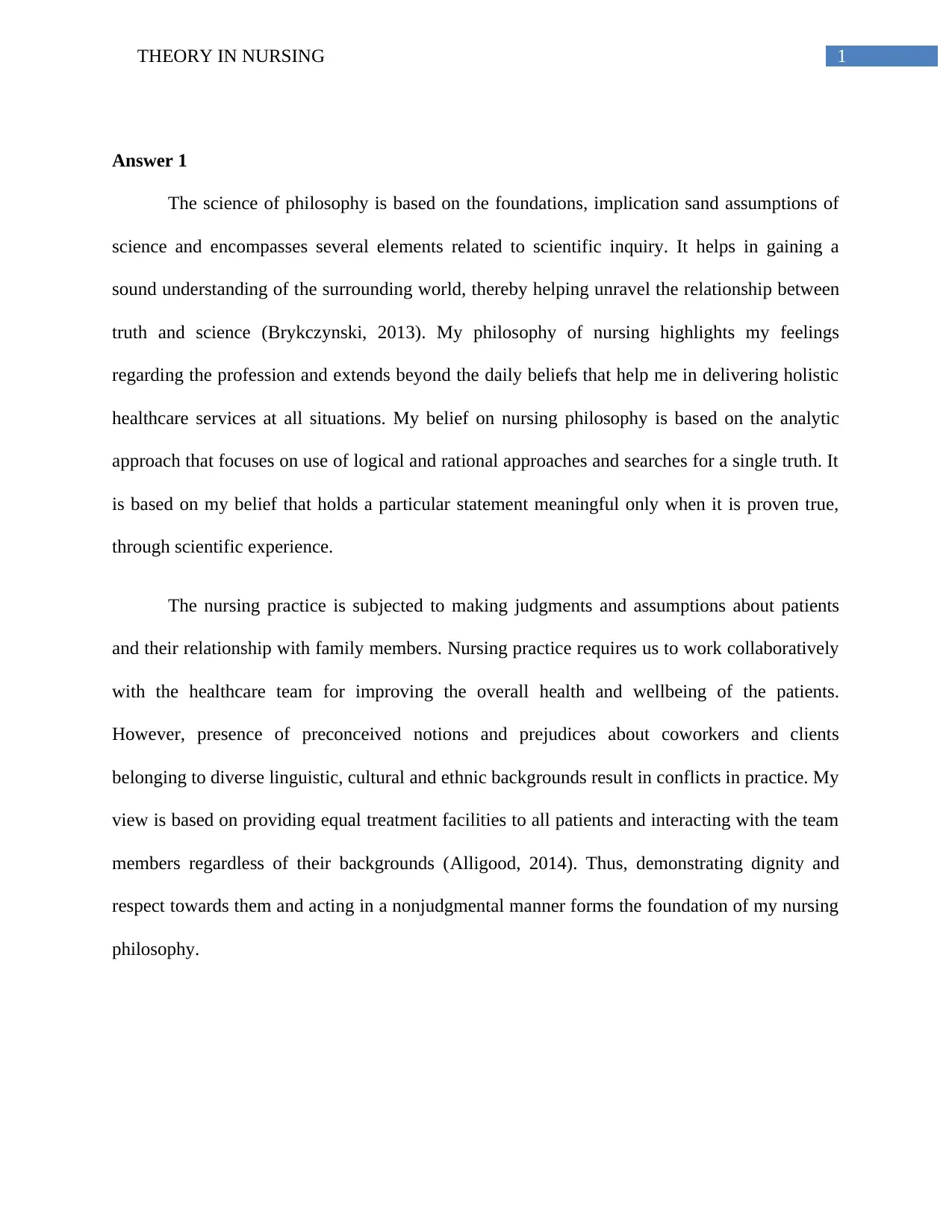
1THEORY IN NURSING
Answer 1
The science of philosophy is based on the foundations, implication sand assumptions of
science and encompasses several elements related to scientific inquiry. It helps in gaining a
sound understanding of the surrounding world, thereby helping unravel the relationship between
truth and science (Brykczynski, 2013). My philosophy of nursing highlights my feelings
regarding the profession and extends beyond the daily beliefs that help me in delivering holistic
healthcare services at all situations. My belief on nursing philosophy is based on the analytic
approach that focuses on use of logical and rational approaches and searches for a single truth. It
is based on my belief that holds a particular statement meaningful only when it is proven true,
through scientific experience.
The nursing practice is subjected to making judgments and assumptions about patients
and their relationship with family members. Nursing practice requires us to work collaboratively
with the healthcare team for improving the overall health and wellbeing of the patients.
However, presence of preconceived notions and prejudices about coworkers and clients
belonging to diverse linguistic, cultural and ethnic backgrounds result in conflicts in practice. My
view is based on providing equal treatment facilities to all patients and interacting with the team
members regardless of their backgrounds (Alligood, 2014). Thus, demonstrating dignity and
respect towards them and acting in a nonjudgmental manner forms the foundation of my nursing
philosophy.
Answer 1
The science of philosophy is based on the foundations, implication sand assumptions of
science and encompasses several elements related to scientific inquiry. It helps in gaining a
sound understanding of the surrounding world, thereby helping unravel the relationship between
truth and science (Brykczynski, 2013). My philosophy of nursing highlights my feelings
regarding the profession and extends beyond the daily beliefs that help me in delivering holistic
healthcare services at all situations. My belief on nursing philosophy is based on the analytic
approach that focuses on use of logical and rational approaches and searches for a single truth. It
is based on my belief that holds a particular statement meaningful only when it is proven true,
through scientific experience.
The nursing practice is subjected to making judgments and assumptions about patients
and their relationship with family members. Nursing practice requires us to work collaboratively
with the healthcare team for improving the overall health and wellbeing of the patients.
However, presence of preconceived notions and prejudices about coworkers and clients
belonging to diverse linguistic, cultural and ethnic backgrounds result in conflicts in practice. My
view is based on providing equal treatment facilities to all patients and interacting with the team
members regardless of their backgrounds (Alligood, 2014). Thus, demonstrating dignity and
respect towards them and acting in a nonjudgmental manner forms the foundation of my nursing
philosophy.
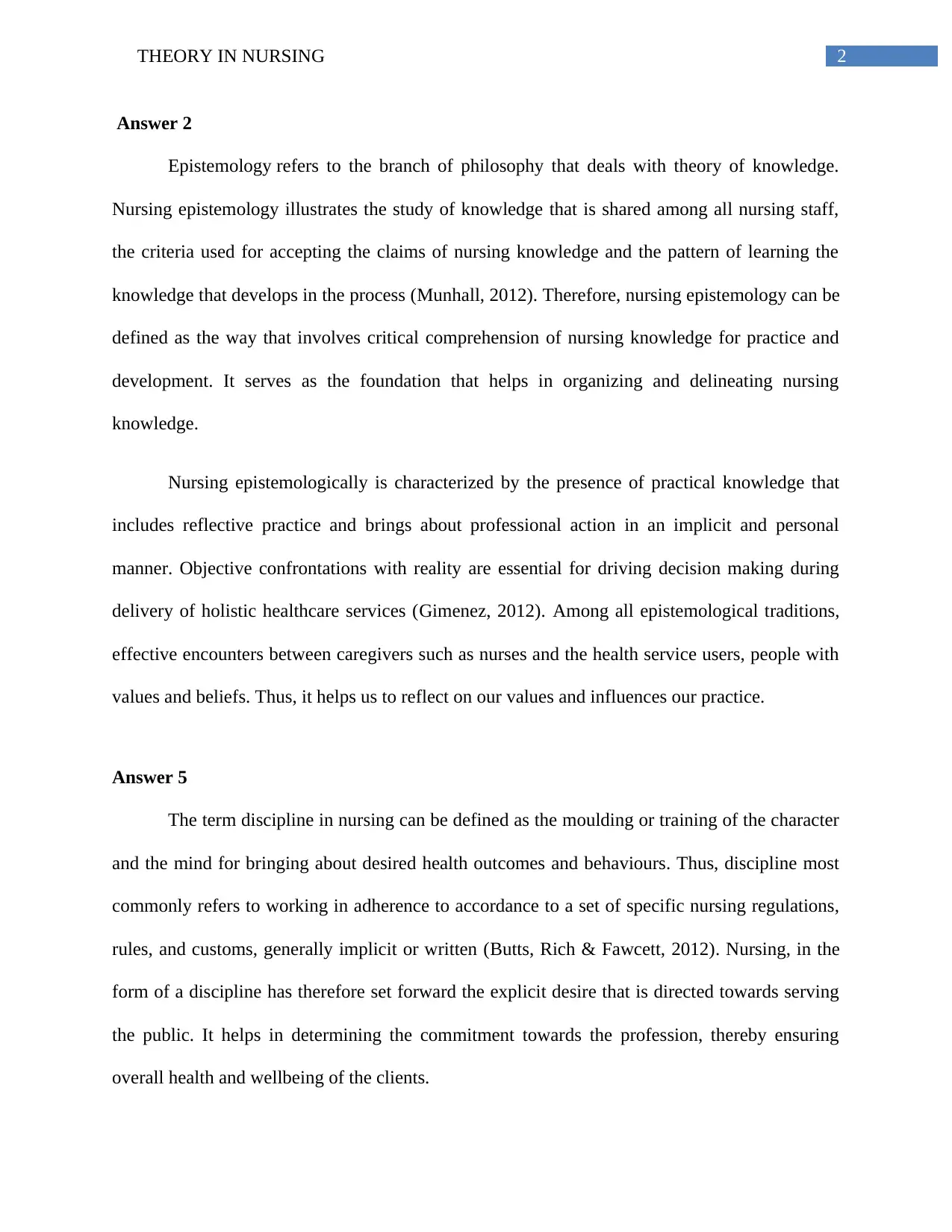
2THEORY IN NURSING
Answer 2
Epistemology refers to the branch of philosophy that deals with theory of knowledge.
Nursing epistemology illustrates the study of knowledge that is shared among all nursing staff,
the criteria used for accepting the claims of nursing knowledge and the pattern of learning the
knowledge that develops in the process (Munhall, 2012). Therefore, nursing epistemology can be
defined as the way that involves critical comprehension of nursing knowledge for practice and
development. It serves as the foundation that helps in organizing and delineating nursing
knowledge.
Nursing epistemologically is characterized by the presence of practical knowledge that
includes reflective practice and brings about professional action in an implicit and personal
manner. Objective confrontations with reality are essential for driving decision making during
delivery of holistic healthcare services (Gimenez, 2012). Among all epistemological traditions,
effective encounters between caregivers such as nurses and the health service users, people with
values and beliefs. Thus, it helps us to reflect on our values and influences our practice.
Answer 5
The term discipline in nursing can be defined as the moulding or training of the character
and the mind for bringing about desired health outcomes and behaviours. Thus, discipline most
commonly refers to working in adherence to accordance to a set of specific nursing regulations,
rules, and customs, generally implicit or written (Butts, Rich & Fawcett, 2012). Nursing, in the
form of a discipline has therefore set forward the explicit desire that is directed towards serving
the public. It helps in determining the commitment towards the profession, thereby ensuring
overall health and wellbeing of the clients.
Answer 2
Epistemology refers to the branch of philosophy that deals with theory of knowledge.
Nursing epistemology illustrates the study of knowledge that is shared among all nursing staff,
the criteria used for accepting the claims of nursing knowledge and the pattern of learning the
knowledge that develops in the process (Munhall, 2012). Therefore, nursing epistemology can be
defined as the way that involves critical comprehension of nursing knowledge for practice and
development. It serves as the foundation that helps in organizing and delineating nursing
knowledge.
Nursing epistemologically is characterized by the presence of practical knowledge that
includes reflective practice and brings about professional action in an implicit and personal
manner. Objective confrontations with reality are essential for driving decision making during
delivery of holistic healthcare services (Gimenez, 2012). Among all epistemological traditions,
effective encounters between caregivers such as nurses and the health service users, people with
values and beliefs. Thus, it helps us to reflect on our values and influences our practice.
Answer 5
The term discipline in nursing can be defined as the moulding or training of the character
and the mind for bringing about desired health outcomes and behaviours. Thus, discipline most
commonly refers to working in adherence to accordance to a set of specific nursing regulations,
rules, and customs, generally implicit or written (Butts, Rich & Fawcett, 2012). Nursing, in the
form of a discipline has therefore set forward the explicit desire that is directed towards serving
the public. It helps in determining the commitment towards the profession, thereby ensuring
overall health and wellbeing of the clients.
⊘ This is a preview!⊘
Do you want full access?
Subscribe today to unlock all pages.

Trusted by 1+ million students worldwide
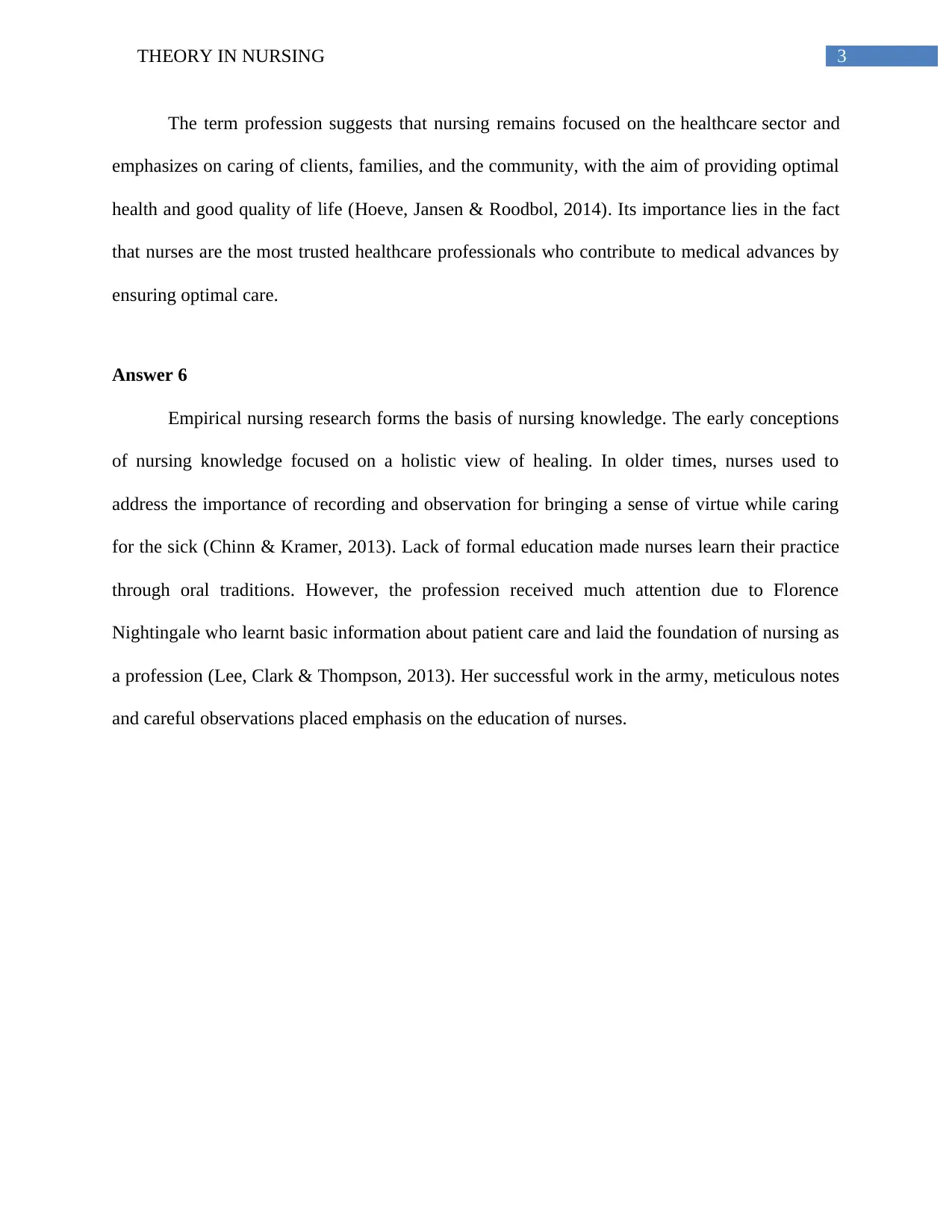
3THEORY IN NURSING
The term profession suggests that nursing remains focused on the healthcare sector and
emphasizes on caring of clients, families, and the community, with the aim of providing optimal
health and good quality of life (Hoeve, Jansen & Roodbol, 2014). Its importance lies in the fact
that nurses are the most trusted healthcare professionals who contribute to medical advances by
ensuring optimal care.
Answer 6
Empirical nursing research forms the basis of nursing knowledge. The early conceptions
of nursing knowledge focused on a holistic view of healing. In older times, nurses used to
address the importance of recording and observation for bringing a sense of virtue while caring
for the sick (Chinn & Kramer, 2013). Lack of formal education made nurses learn their practice
through oral traditions. However, the profession received much attention due to Florence
Nightingale who learnt basic information about patient care and laid the foundation of nursing as
a profession (Lee, Clark & Thompson, 2013). Her successful work in the army, meticulous notes
and careful observations placed emphasis on the education of nurses.
The term profession suggests that nursing remains focused on the healthcare sector and
emphasizes on caring of clients, families, and the community, with the aim of providing optimal
health and good quality of life (Hoeve, Jansen & Roodbol, 2014). Its importance lies in the fact
that nurses are the most trusted healthcare professionals who contribute to medical advances by
ensuring optimal care.
Answer 6
Empirical nursing research forms the basis of nursing knowledge. The early conceptions
of nursing knowledge focused on a holistic view of healing. In older times, nurses used to
address the importance of recording and observation for bringing a sense of virtue while caring
for the sick (Chinn & Kramer, 2013). Lack of formal education made nurses learn their practice
through oral traditions. However, the profession received much attention due to Florence
Nightingale who learnt basic information about patient care and laid the foundation of nursing as
a profession (Lee, Clark & Thompson, 2013). Her successful work in the army, meticulous notes
and careful observations placed emphasis on the education of nurses.
Paraphrase This Document
Need a fresh take? Get an instant paraphrase of this document with our AI Paraphraser
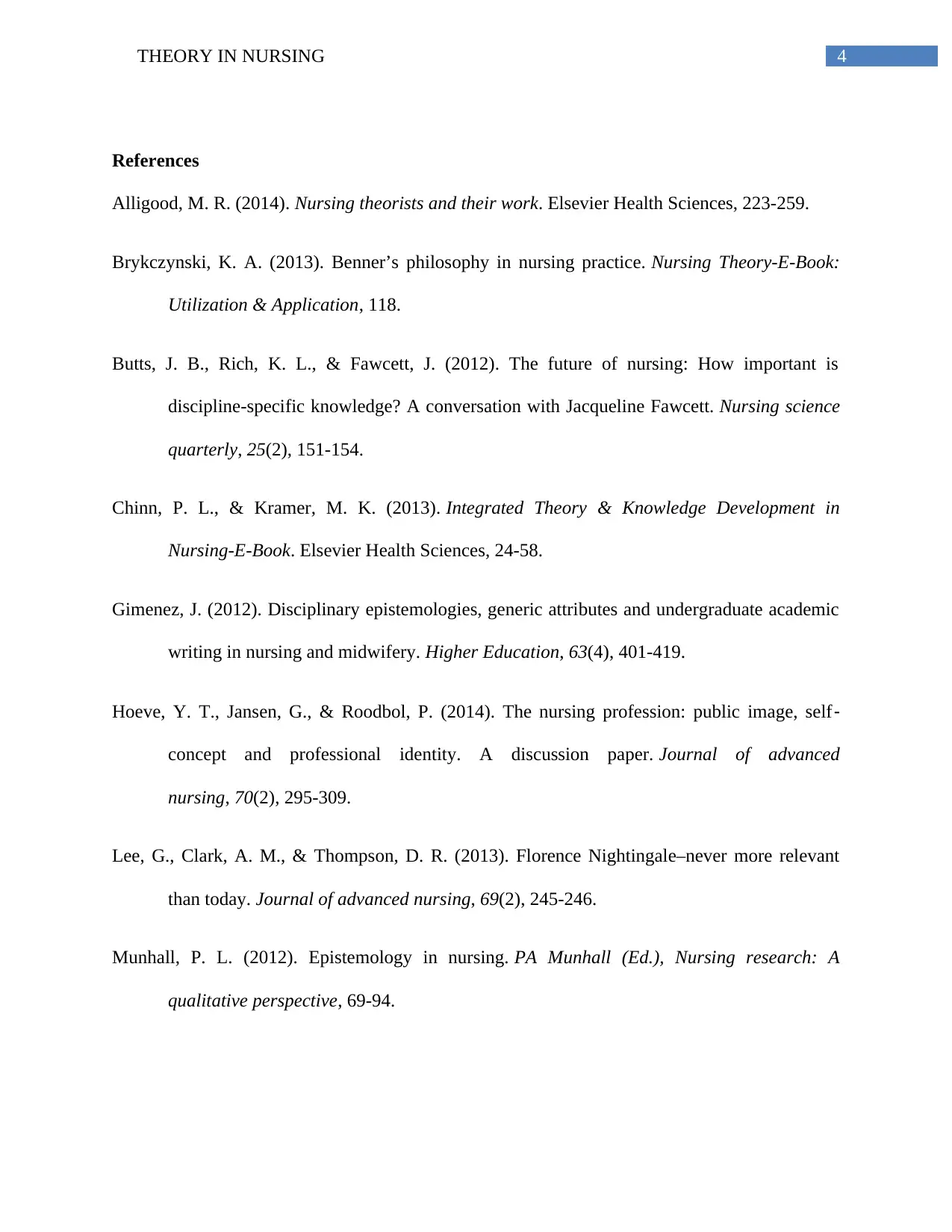
4THEORY IN NURSING
References
Alligood, M. R. (2014). Nursing theorists and their work. Elsevier Health Sciences, 223-259.
Brykczynski, K. A. (2013). Benner’s philosophy in nursing practice. Nursing Theory-E-Book:
Utilization & Application, 118.
Butts, J. B., Rich, K. L., & Fawcett, J. (2012). The future of nursing: How important is
discipline-specific knowledge? A conversation with Jacqueline Fawcett. Nursing science
quarterly, 25(2), 151-154.
Chinn, P. L., & Kramer, M. K. (2013). Integrated Theory & Knowledge Development in
Nursing-E-Book. Elsevier Health Sciences, 24-58.
Gimenez, J. (2012). Disciplinary epistemologies, generic attributes and undergraduate academic
writing in nursing and midwifery. Higher Education, 63(4), 401-419.
Hoeve, Y. T., Jansen, G., & Roodbol, P. (2014). The nursing profession: public image, self‐
concept and professional identity. A discussion paper. Journal of advanced
nursing, 70(2), 295-309.
Lee, G., Clark, A. M., & Thompson, D. R. (2013). Florence Nightingale–never more relevant
than today. Journal of advanced nursing, 69(2), 245-246.
Munhall, P. L. (2012). Epistemology in nursing. PA Munhall (Ed.), Nursing research: A
qualitative perspective, 69-94.
References
Alligood, M. R. (2014). Nursing theorists and their work. Elsevier Health Sciences, 223-259.
Brykczynski, K. A. (2013). Benner’s philosophy in nursing practice. Nursing Theory-E-Book:
Utilization & Application, 118.
Butts, J. B., Rich, K. L., & Fawcett, J. (2012). The future of nursing: How important is
discipline-specific knowledge? A conversation with Jacqueline Fawcett. Nursing science
quarterly, 25(2), 151-154.
Chinn, P. L., & Kramer, M. K. (2013). Integrated Theory & Knowledge Development in
Nursing-E-Book. Elsevier Health Sciences, 24-58.
Gimenez, J. (2012). Disciplinary epistemologies, generic attributes and undergraduate academic
writing in nursing and midwifery. Higher Education, 63(4), 401-419.
Hoeve, Y. T., Jansen, G., & Roodbol, P. (2014). The nursing profession: public image, self‐
concept and professional identity. A discussion paper. Journal of advanced
nursing, 70(2), 295-309.
Lee, G., Clark, A. M., & Thompson, D. R. (2013). Florence Nightingale–never more relevant
than today. Journal of advanced nursing, 69(2), 245-246.
Munhall, P. L. (2012). Epistemology in nursing. PA Munhall (Ed.), Nursing research: A
qualitative perspective, 69-94.
1 out of 5
Related Documents
Your All-in-One AI-Powered Toolkit for Academic Success.
+13062052269
info@desklib.com
Available 24*7 on WhatsApp / Email
![[object Object]](/_next/static/media/star-bottom.7253800d.svg)
Unlock your academic potential
Copyright © 2020–2026 A2Z Services. All Rights Reserved. Developed and managed by ZUCOL.





